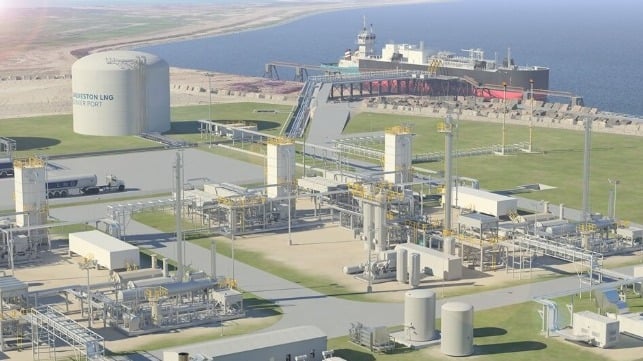Galveston LNG Bunker Terminal Moves Ahead

Galveston LNG Bunker Port has filed applications with the United States Army Corps of Engineers (USACE) to build its small-scale LNG terminal on Shoal Point in Texas City, Texas. If approved, the project would be the first purpose-built LNG bunker terminal in the area, and the port's second LNG fueling service.
The planned terminal includes two liquefaction trains capable of putting out 600,000 gallons of LNG per day, two 3-million-gallon storage tanks, a bunker vessel loading berth, and associated marine and loading facilities.
In addition to the USACE application, partners Seapath Group and Pilot LNG have also asked the Texas Railroad Commission (TRRC) and the United States Coast Guard (USCG) for permission to build.
"This facility is a critical investment into the resilience of the United States' maritime infrastructure," said Joshua Lubarsky, President of JV partner Seapath Group.
LNG is one of the most popular options for dual-fuel vessel orders. According to data from DNV, there were about 470 LNG-powered vessels in operation globally as of the end of 2023, with over 500 more on order. A record 240 LNG-fueled ship orders were placed in 2021, 222 more in 2022 and another 130 in 2023. The LNG-powered fleet should exceed 1,000 vessels by 2027, DNV reports.
The growth has been particularly pronounced in the container ship, car carrier, and cruise ship sectors, and Galveston is a major cruise port.

that matters most
Get the latest maritime news delivered to your inbox daily.
The new terminal expands on previous efforts to establish Galveston as a hub for LNG fueling. In 2021, the Port of Galveston and Stabilis Solutions agreed to launch the use of LNG as a marine fuel at the port. Stabilis provides the fuel, and Seaside LNG provides the bunkering barge. Customers include Carnival Jubilee, which became the first ship on the Gulf Coast to receive ship-to-ship LNG bunkering in December 2023.
"The Galveston Wharves views LNG fueling of marine vessels as an important step in our commitment to environmental stewardship," said Rodger Rees, Port Director and CEO, in 2021. "With the number of LNG-fueled vessels in the global fleet growing rapidly, having LNG fueling services in the port is an important step in our commercial growth."
